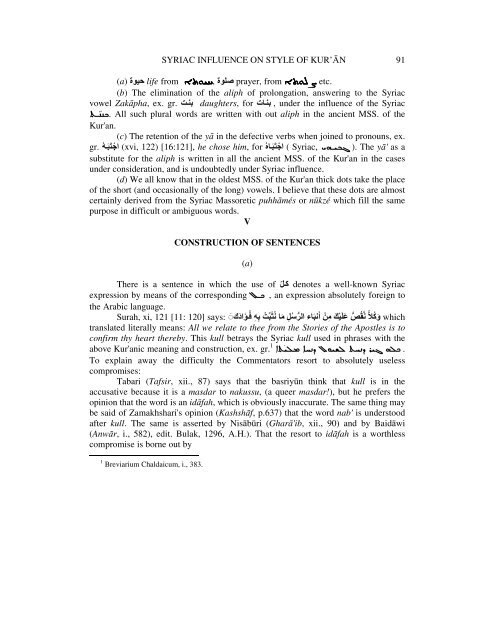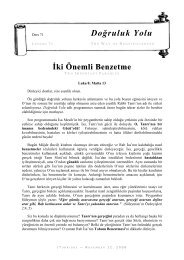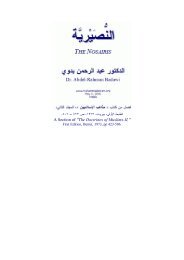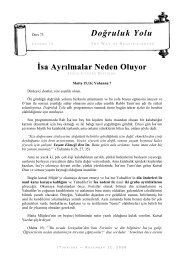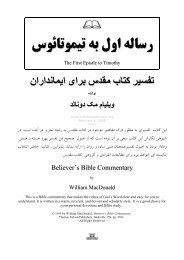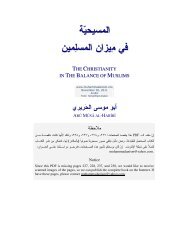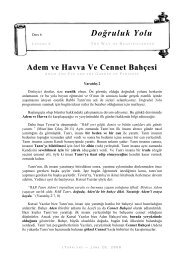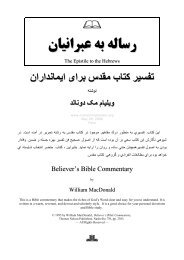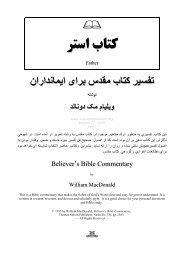Syriac Influence on the Style of the Kur'an - Muhammadanism
Syriac Influence on the Style of the Kur'an - Muhammadanism
Syriac Influence on the Style of the Kur'an - Muhammadanism
Create successful ePaper yourself
Turn your PDF publications into a flip-book with our unique Google optimized e-Paper software.
SYRIAC INFLUENCE ON STYLE OF KUR’ĀN 91ܚܝܘܬܐ life from وة (a)etc. ܨܠܘܬܐ(b) The eliminati<strong>on</strong> <strong>of</strong> <strong>the</strong> aliph <strong>of</strong> prol<strong>on</strong>gati<strong>on</strong>, answering to <strong>the</strong> <str<strong>on</strong>g>Syriac</str<strong>on</strong>g>vowel Zakāpha, ex. gr. بنت daughters, for بنات , under <strong>the</strong> influence <strong>of</strong> <strong>the</strong> <str<strong>on</strong>g>Syriac</str<strong>on</strong>g>. All such plural words are written with out aliph in <strong>the</strong> ancient MSS. <strong>of</strong> <strong>the</strong><strong>Kur'an</strong>.(c) The retenti<strong>on</strong> <strong>of</strong> <strong>the</strong> yā in <strong>the</strong> defective verbs when joined to pr<strong>on</strong>ouns, ex.gr. اجْ تَبَهُ (xvi, 122) [16:121], he chose him, for اجْ تَبَاهُ ( <str<strong>on</strong>g>Syriac</str<strong>on</strong>g>, ). The yā' as asubstitute for <strong>the</strong> aliph is written in all <strong>the</strong> ancient MSS. <strong>of</strong> <strong>the</strong> <strong>Kur'an</strong> in <strong>the</strong> casesunder c<strong>on</strong>siderati<strong>on</strong>, and is undoubtedly under <str<strong>on</strong>g>Syriac</str<strong>on</strong>g> influence.(d) We all know that in <strong>the</strong> oldest MSS. <strong>of</strong> <strong>the</strong> <strong>Kur'an</strong> thick dots take <strong>the</strong> place<strong>of</strong> <strong>the</strong> short (and occasi<strong>on</strong>ally <strong>of</strong> <strong>the</strong> l<strong>on</strong>g) vowels. I believe that <strong>the</strong>se dots are almostcertainly derived from <strong>the</strong> <str<strong>on</strong>g>Syriac</str<strong>on</strong>g> Massoretic puhhāmés or nūkzé which fill <strong>the</strong> samepurpose in difficult or ambiguous words.V,ܚܝܘܬܐprayer, from صلوةܨܠܘܬܐحيCONSTRUCTION OF SENTENCES(a)There is a sentence in which <strong>the</strong> use <strong>of</strong> كلّ denotes a well-known <str<strong>on</strong>g>Syriac</str<strong>on</strong>g>expressi<strong>on</strong> by means <strong>of</strong> <strong>the</strong> corresp<strong>on</strong>ding , an expressi<strong>on</strong> absolutely foreign to<strong>the</strong> Arabic language.Surah, xi, 121 [11: 120] says: َ◌ whichtranslated literally means: All we relate to <strong>the</strong>e from <strong>the</strong> Stories <strong>of</strong> <strong>the</strong> Apostles is toc<strong>on</strong>firm thy heart <strong>the</strong>reby. This kull betrays <strong>the</strong> <str<strong>on</strong>g>Syriac</str<strong>on</strong>g> kull used in phrases with <strong>the</strong>above <strong>Kur'an</strong>ic meaning and c<strong>on</strong>structi<strong>on</strong>, ex. gr. 1 .To explain away <strong>the</strong> difficulty <strong>the</strong> Commentators resort to absolutely uselesscompromises:Tabari (Tafsir, xii., 87) says that <strong>the</strong> basriyūn think that kull is in <strong>the</strong>accusative because it is a masdar to nakussu, (a queer masdar!), but he prefers <strong>the</strong>opini<strong>on</strong> that <strong>the</strong> word is an idāfah, which is obviously inaccurate. The same thing maybe said <strong>of</strong> Zamakhshari's opini<strong>on</strong> (Kashshāf, p.637) that <strong>the</strong> word nab' is understoodafter kull. The same is asserted by Nisābūri (Gharā'ib, xii., 90) and by Baidāwi(Anwār, i., 582), edit. Bulak, 1296, A.H.). That <strong>the</strong> resort to idāfah is a worthlesscompromise is borne out by1 Breviarium Chaldaicum, i., 383.وَكُالًّ ن َّقُص ُّ عَلَيْكَ مِنْ أَنبَاء الر ُّسُ لِ مَا نُثَب ِّتُ بِهِ فُؤَادَك


